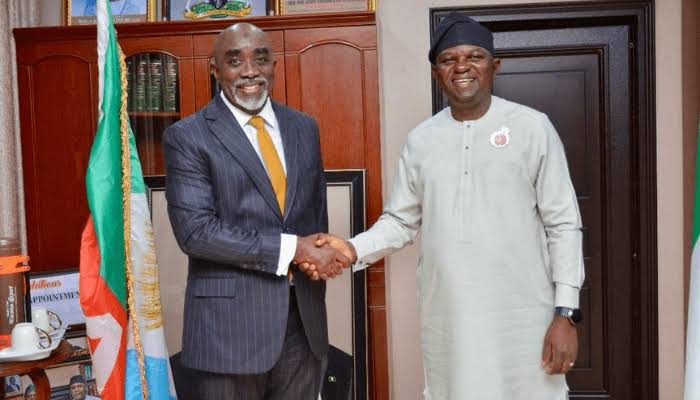Nigeria’s Water Resources Minister Pledges Tackling Irrigation Challenges Facing Sugar Production
By: Jennifer Inah
The Nigerian Minister of Water Resources, Mr Joseph Utsev, has pledged to find solutions to the number of issues affecting the supply of water to sugar estates across the country.
The Minister said supporting the National Sugar Development Council (NSDC) to achieve its mandate in the area of self-sufficiency in sugar production is a task that must be done, adding that his Ministry would do everything possible to tackle the identified stumbling blocks.
The Minister said this when he hosted the Executive Secretary/CEO of the NSDC, Mr. Kamar Bakrin, and his management team in his office.
Mr. Bakrin sought the support of the Minister in addressing and finding lasting solutions to the issues surrounding irrigation and access to water which the sugar operators complain about.
“Sugarcane requires a steady supply of between 1,500mm and 2,500mm of water throughout its extensive growth cycle, which spans 12 to 18 months. Without this, the crop suffers, leading to lower yields and diminished sugar content.
“Sustainable water sourcing is required for modern irrigation which minimises environmental impact and enhances viability.
Water availability impacts both sugarcane quality and yield. Sufficient water boosts sucrose levels, enhancing sugar output per hectare and supporting profitability.
Sugarcane growth relies on water availability and enables optimal yields,” he said.
Specifically, the NSDC boss sought the approval of the Minister for a 20km open canal water conveyance system from River Hadejia to Gagarawa in Jigawa state to service the Great Northern Nigeria Agri-business Limited which has a 5,000 TCD project in Hadejia.
The Executive Secretary noted that the project will create more than 5,000 jobs from its farm and factory operations on completion.
The ES informed the Minister that GNAL signed an MOU with the Jigawa State Government in June 2015 to develop a sugarcane farm and processing factory to produce 100,000 tons of sugar annually.
“Based on this MOU, GNAL acquired over 12,000Ha of farmland in Gagarawa LGA of the state.
“The design and the tender process for the construction of the factory have been completed and more than 1,600 ha of land has been cleared up to date.
“In 2018, a Water Use License with an annual water abstraction threshold of 249 millionm³ was granted to GNAL by the Federal Ministry of Water Resources for irrigation of the sugarcane farm.
“The design of the project’s Bulk Water Supply (BWS) and Field Irrigation System was completed in 2022 and submitted to the Federal Ministry of Water Resources for approval. However, this approval is yet to be granted,” the NSDC boss said.
He therefore requested that the Minister intervene and grant approval of GNAL’s design of the sugar estate’s BWS and Field Irrigation System.
Mr. Bakrin also sought the implementation of the Presidential approval for the exemption of businesses participating in the Nigeria Sugar Masterplan (NSMP) II from payment of Annual Right-of-Way or assigned water usage or any such fees.
“A Presidential approval was given in March 2023 for the exemption of businesses participating in the NSMP from payment of Annual Right-of-Way or assigned water usage or any such fees. However, Dangote Sugar Refinery (DSR) continues to face increasing water charges from Kiri Dam for its use of water despite this approval.
“DSR applied for the approval for the Ministry in 2022, to construct a Primary Canal that will supply water to parts of its estate. However, this request is still pending in the Ministry,” he said.
Other DSR-specific requests made by the NSDC team includes the approval of its request to support the dredging of the Kiri Dam and the necessary Primary Canals; and approval of the request for the construction of a primary canal that will supply water to the estate.
He noted that the project has a workforce of over 15,000 skilled and semiskilled workers and it’s water usage is expected to increase as it places more land under cane.
Mr. Bakrin also made a couple of proposals for Niger River Flooding Management to manage flood risk to Sunti, Niger state, where Golden Sugar Estate is located. The proposals include the conduct of regular dredging of the Niger River to enhance water flow capacity, installation of flow gauges along key points of the river to improve real-time monitoring and early warning capabilities and improvement of collaboration among key stakeholders connected to the river.
The ES sought the enhancement of the ability to agree and generate targets for the coming season and the cycle of water releases from the reservoirs that would serve both power generation and irrigation needs, while optimising flood control.
He also sought the significant improvement of meteorological and climatological forecasting, which will over time, enhance the capacity to anticipate and respond to flooding patterns.
This project, he said, “has created about 5,000 jobs but faces significant threat of flooding from the River Niger.”
The NSDC helmsman emphasised the importance of doing everything possible to ease local production, saying if all the bottlenecks are not removed, the operators will continue to import from Brazil.
“We need to stop this because the harm it does to our economy is so significant. This is the reason they keep giving for why they say it is too expensive for us to produce locally. We can’t allow this to continue to happen. It is damaging the local economy,” he said.
Responding, the Minister said he is willing to work with the NSDC and other stakeholders to address the issues.
Olusola Akintonde


Comments are closed.